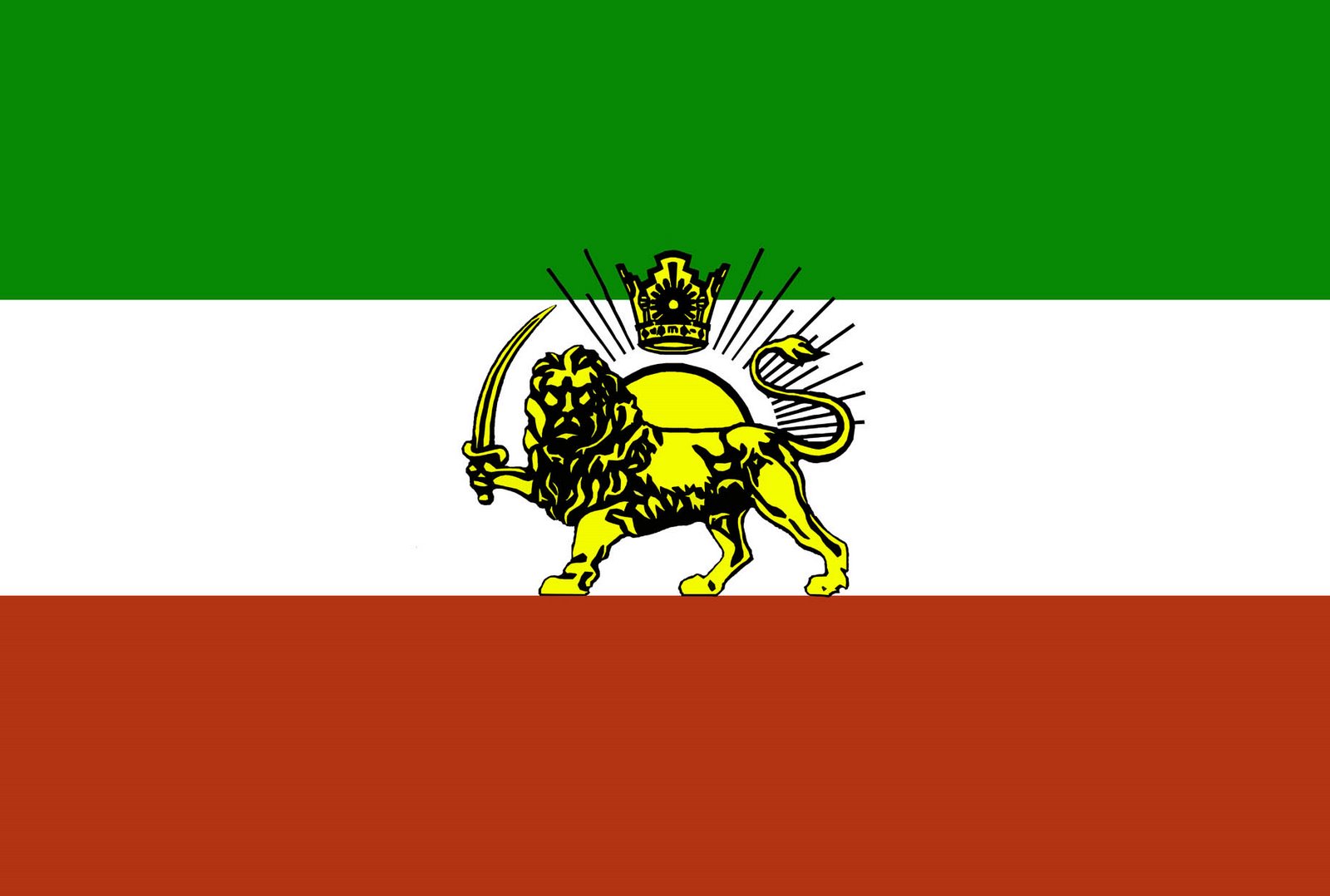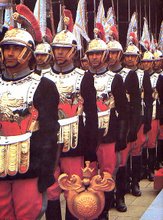Petition for the leadership of our struggle to free Iran
This petition is organized by a group of concerned Iranians who want to see the present religious dictatorship regime in Iran to be replaced with a democratic secular regime. The group members have been active in various opposition groups throughout the past years and have finally decided that the only viable force against the mullahs' regime is one that is lead by Shahzadeh Reza Pahlavi.
We would like to collect as many signatures as possible, however we understand your concerns regarding security and confidentiality, for this reason we have provided many methods for you to use to achieve this goal, but ultimately we need your signature and vote to add to millions of others for freedom of our home land.
You can sign the Petition Online, download a copy of the Petition Form and corresponding petition text in Persian to sign and fax to us, or simply fax or email us with your vote.
For further information please see the INFORMATION page.
Long Live Iran
Thursday, November 29, 2007
Please sign this petition!
Saturday, November 24, 2007
Memoirs of an Iranian Islamo-Marxist Rebel

ESCAPING A MAZE OF HATRED
by Amir Taheri
Asharq Alawsat
July 25, 2004
MASOUD: Memoirs of an Iranian Rebel
By: Masoud Banisadr
473 Pages
Saqi Publications, London, 2004
Let's say it right from the start: this book is a masterpiece and a must-read for anyone interested in such subjects as sects, thought control, terrorism, and totalitarianism.
This book is a masterpiece not because it is well-written. In fact, it is not. Banisadr's style, a mixture of business reports and women's magazines' confessions, at times exasperating. Nevertheless, it is a masterpiece, perhaps, because it tells a moving story, what am I saying, a shattering story, honestly and unencumbered by the artefacts of literary style.
Masoud: Memoirs of An Iranian Rebel could remind some readers of Arthur Koestler's classic "Darkness at Noon", an account of how Communism can turn perfectly sane and well-educated men and women into delusional maniacs.
To tell the truth, however, I find " Masoud" even more moving, if only because the ideology that destroyed Masoud's life was more bizarre than Marxism-Leninism.
Masoud Banisadr, the writer of these memoirs, is a 51-year old Iranian-born science graduate who joined the Mujahedin Khalq (People's Combatants), one of a dozen or so guerrilla groups fighting the Shah in the 1960s and 1970s.
The Mujahedin had a special appeal because they mixed Islamic themes, which had become popular in Iran in the 1960s, with leftist slogans that had attracted some Iranian intellectuals between the 1940s and1960s. The Shah called them "Islamic-Marxists", a label which, though not accurate, was not off the mark either.
By 1978 when the Islamic revolution was bursting on the Iranian scene like a tsunami in a lagoon, the Mujahedin were regarded as selfless, and ruthless, fighters for the cause, whatever it was. They had murdered dozens of people, including bank officials, ordinary policemen, provincial clerks, and, more spectacularly, several American military technician hired by the Shah.
During the revolution, the Mujahedin acted as the vanguard of the movement. They attacked and burned banks, restaurants, bookshops, cinemas, and other "places of sin". They also assassinated army officers, policemen and gendarmes.
Throughout the revolution, which took less than a year to triumph, the Mujahedin praised Ayatollah Ruhallah Khomeini as a political idol. They invented the slogan " God is Unique, Khomeini is the Leader!" (Allah Wahed! Khomeini Qa'ed!) All along, however, the Mujahedin leaders believed that Khomeini, an old and apparently frail cleric, would seek no political role after the Shah.
When the revolution triumphed, it was only natural for the Mujahedin to expect a seat at the high table. By the spring of 1979, however, it had become clear that the new revolutionary regime would not only refuse the Mujahedin even a side-chair but also regarded them as something of a nuisance.
Struck by hubris, the Mujahedin leaders persuaded themselves that Khomeini had "stolen" their revolution. They could not admit that it was Khomeini's leadership and charisma, and not Mujahedin acts of terror, that had mobilised the masses and ensured the victory of the revolution.
Emboldened by a few allies in the new revolutionary establishment, notably a prominent mullah called Mahmoud Taleqani, the Mujahedin embarked on a policy of provocation against the new revolutionary regime which, in time, persuaded Khomeini that the only way to deal with them was to destroy their organisation.
While all that was happening, Masoud, our memoirist, was a student in England working on a Ph. D in a scientific subject. He had been attracted to the Mujahedin in 1977 and militated on their behalf in one of their many front organisations known as the Muslim Students Society in Northern England.
An Ideal Catch
Masoud was the ideal catch for the Mujahedin.
He had had a turbulent childhood marked by his parents' divorce and remarriage. Both his father and his step-father had been army officers who neither wanted to nor did manifest any hostility towards the Shah. Masoud, however, grew up in an atmosphere created by two decades of intense anti-Shah propaganda by the regime's many enemies: from the Tudeh (Masses) Communists to disgruntled mullahs and passing by the leftist guerrilla groups already mentioned.
Together they had created an anti-Shah culture based on a number of lies, misrepresentations, and hallucinations. They dreamed of revolution not only as a means of getting rid of the Shah but also, perhaps especially, to sort out their inner contradictions.
During the revolution the Mujahedin had told Masoud to love Khomeini and hate the Shah. He had done so with exceptional devotion. He recalls how he had not been able to go to sleep without cursing the Shah and praying for Khomeini.
But when the Mujahedin broke with Khomeini, the ayatollah became their chief object of hate. Masoud was told to hate Khomeini and start loving the Mujahedin leader Masoud Rajavi. He did so without any qualms. Suddenly, it was Khomeini that he cursed and Rajavi that he prayed for every night.
Masoud Banisadr had missed the revolution in Iran and felt almost cheated. This was why the idea of a second revolution, this time against Khomeini, a revolution that would give him a chancre to prove how selfless a fighter he is, appealed to him.
To sum up Masoud Banisadr needed four things to give his life meaning:
A set of lies that he could believe as absolute truth. These had been provided by the Shah's enemies for years. A new version of them was now manufactured by Khomeini's enemies. The Shah had been presented as an "American agent". It was now Khomeini's turn to be accused of being in cahoots with the Americans and the British.
Someone to worship and someone to hate. Until 1979 the Shah had provided the hate figure while Khomeini had represented the love idol. After that Khomeini became the symbol of hate and Rajavi of love.
The illusion that there was an historic or even a divine mission that one had to undertake on behalf of one's nation, if not mankind as a whole.
A cocoon in which to escape from the real world and build an alternative universe. The Mujahedin offered precisely such a cocoon.
From 1977 until he broke with the Mujahedin nearly 20 years later, Masoud Banisadr was a prisoner in a parallel world created by one of the most ruthless sects seen in the last century.
As a member of Mujahedin he was ordered to burn all his books, notes and documents, which he promptly did.
The typical Mujahed was ordered not to read anything not authorised or published by the Mujahedin. He could not even read the Koran unless asked to do so by the organisation with its own commentaries. The Mujahed could not go to cinema, unless on an organisational mission; could not watch television or listen to radio except those controlled by the organisation, and had to refrain from forging any relationship with "outsiders." The Mujahed's children had to attend special schools controlled by the orgasiation.
The idea was to totally isolate the Mujahed from the outside world and gradually kill his critical faculties. He was to be left with a single view of the existence: the fiction created by the " Supreme Leader" Masoud Rajavi and his aides.
At a later stage the Mujahedin were ordered to stop loving their wives or husbands and children because that would reduce from their love for Rajavi. But then Rajavi decided that that, too, was not enough. He ordered all Mujahedin to divorce their wives or husbands. Once they had complied, the " Supreme Leader" ordered the Mujahedin to eliminate their natural sexual desires. Special agents would check the Mujahedin's urine sample to see if it contained " traces of sexual excitement", whatever that means.
At a still later stage the male Mujahedin were ordered to transfer all the top jobs to their female colleagues and accept the superiority of women over men.
In the meantime, Masoud Rajavi had divorced his second wife, a daughter of Abol-Hassan Banisadr who had briefly served as President of the Islamic Republic under Khomeini. But Rajavi was not bound by the rules he fixed for others. He asked his number-two Mahdi Abrishmachi to divorce his wife, Maryam Azodanlu-Qajar; and the latter promptly complied. A few days later Rajavi announced that he had married Maryam, Abrishamchi's divorced wife. The Mujahedin were ordered to celebrate the event as a great revolutionary and historic event, which they did without zeal.
The idea was to show that Rajavi was the only person who was above all laws, man-made or ordained by God.
The Mujahedin not only accepted whatever Rajavi did but also went out of their way to present his deeds as sacrifices on his part. He had fled from Tehran to Paris, hidden in women's clothes aboard a hijacked aircraft, and presented his escape as " the most courageous act of heroism", and the Mujahedin had believed him. And when Rajavi signed a "treaty" with Tareq Aziz, then one of Saddam Hussein's top aides, to help Iraq in the war against Iran, the Mujahedin hailed the move as "a great patriotic act."
Needless to say the Mujahedin had no qualms to take up arms, enter Iran under the wing of the invading Iraqi armies, to kill Iranians and burn their villages in the name of their revolution. Rajavi had told them to hate America for years. But, after 1983, he urged the Mujahedin to do all they could to win Washington's support, including collecting information for the CIA. In the lexicon created by Rajavi, treason meant patriotism, and freedom was nothing but blind obedience of the chief.
The reader might assume that Banisadr wrote his memoirs to unmask and discredit Rajavi. Paradoxically, however, Masoud Rajavi emerges from this book with a less ugly image than that of his followers, including our talented memoirist.
Doing What He Did Best
After all, Rajavi did what he knew best: building his personality cult.
When he was propelled into the leadership of the Mujahedin in 1979, Rajavi was a 30-year old ex-student who had spent six years in prison.
He had virtually no higher education and his political experience was limited to a few armed attacks on isolated gendarmerie posts and a failed attempt to kidnap the American ambassador in Tehran. Nevertheless, he was hailed by tens of thousands, if not hundreds of thousands, of young Iranians, most of them students or graduates, not only as a political leader but also as a saviour.
In other words, it was those young enthusiasts who had a problem not Rajavi. All that Rajavi did was to comply with an old Iranian dictum: if the people act as a donkey, just ride them!
Masoud Banisadr, our memoirist, was roughly the same age as Masoud Rajavi. He was better educated than Rajavi because he had completed his university course, obtained a PH.D, and learned English. He had also more practical political experience because he had organised a student union , managed fund-raising events, and lobbied British parliamentarians, journalists and trade union leaders. And yet, Masoud Banisadr regarded Masoud Rajavi as almost a god. He was ready to lie, cheat, betray and even kill for Rajavi.
Banisadr was not alone.
Almost all the Mujahedin cadres were better educated and more experienced than Rajavi. But Rajavi was able to play with them like toys. He would order them to divorce their wives and they would do so without protest. He would tell them to hate each other and use abusive language against their closest comrades, and they would do so with zeal. He would ask them to laugh or to cry, and even, quite literally, to dance for him and they would do so like circus bears.
So: who was it who had a problem?
Rajavi or those who helped build his personality cult?
Lacking education and experience, Rajavi acted on animal instinct. He realised that the revolution, which many had dreamed of but few had really wanted, had produced large numbers of rootless people looking for a measure of certainty.
Rajavi was clever enough to know that only well-educated individuals could be deceived in a big way. Ordinary people, the illiterate peasants and semi-literate workers, could be deceived in small maters, but never on big ones, if only because they lacked the imagination needed to believe big lies. For example, no Iranian peasant shed a tear when Stalin died in 1953 while many Iranian poets wrote qasidas to mourn the Soviet dictator. No Iranian peasant or worker joined the Khomeinist movement until after the Shah had shown that he was no longer able to play the role of the " father."
At one point in 1988 Rajavi boasted that the Mujahedin were the only organisation in which people with university degrees were a majority. He was more right than he had imagined. His sect included famous poets, writers, entertainers, footballers, and scientists.
Among his worshippers were a grandson of the late Dr. Muhammad Mussadeq, the idol of anti-Shah bourgeoisie, several of Khomeini's closest former advisers, and numerous defectors from various Communist outfits.
Now put yourself in Rajavi's place.
You see that so many people, all of them your superiors by education and experience, come every day to worship you as an idol. They tell you are the greatest, the cleverest, the bravest, the best-looking, the most blessed of the human species EVER created.
What would you think?
If you have a sense of humour you might think that they are pulling your leg. But if you suffer from egomania, as Rajavi did, you would believe that you are doing them a favour by letting them worship you.
During the last 20 years of their activity, the Mujahedin caused the death of at least a quarter of a million Iranians. Their hit-squads and suicide-bombers killed hundreds of officials, religious leaders, and personalities of the Khomeinist regime. In their border attacks on Iran, from bases in Iraq, the Mujahedin killed large numbers of innocent Iranians. In turn, the regime executed thousands of Mujahedin members and sympathisers.
Masoud Banisadr's memoirs are particularly chilling because he makes it clear that there is no complete cure for political self-deception.
Masoud Banisadr managed to get out of the Mujahedin after almost 20 years. But he has not managed to get the Mujahedin out of himself. He still defends their criminal project and has difficulty hiding his hateful admiration for the sect.
The reader would be astonished that Masoud Banisadr still considers himself to be " in love", not physically of course, with Maryam, Rajavi's third wife who was appointed by the latter as " President of Iran."
Is it because Maryam symbolises the mother-figure that Masoud Banisadr had always craved for?
More importantly, Masoud Banisadr has not cured his initial ailment, the need for someone to hate irrationally and someone to love beyond reason. Today, his object of hate is Masoud Rajavi. And, if my reading is correct, his new object of love is Dr. Mussadeq.
Fortunately for Banisadr, Mussadeq is dead and would not be able to ride him as Rajavi had done.
The final chapters of this book read like a thriller. We see Masoud Banisadr trying to escape from the clutches of the sect. At one point he narrowly escapes being kidnapped by Mujahedin goons at Baker Street in London, and shipped to Baghdad.
Masoud: Memoirs of An Iranian Rebel is a book not to miss.
Please, please , someone translate it into Arabic, Persian and , in fact, all other languages of Islam. And quickly!
Labels:
anti-shah,
communists,
Iran,
Iranian,
islamists,
leftists,
marxists,
Mojahedin,
terrorists
Thursday, November 22, 2007
Shahanshah Aryamehr - "Meet the Press" 1973
His Imperial Majesty Mohammad Reza Pahlavi, Shahanshah of Iran, on an MSNBC "Meet the Press" interview (1973)- declares the independence of the Iranian Government from any foreign powers despite intense propaganda from anti-Shah factions (Leftists/Islamists).
LINK
Labels:
1973,
Aryamehr,
independence,
msnbc,
Pahlavi,
Shah,
Shahanshah
Sunday, November 18, 2007
Friday, November 16, 2007
¡Viva el Rey!
Long Live the Spanish King!


Shut up, Spain's king tells Chavez
Source
Spain's King Juan Carlos told Venezuelan leader Hugo Chavez to "shut up" as the Ibero-American summit drew to a close in Santiago, Chile.
The outburst came after Mr Chavez called former Spanish Prime Minister Jose Maria Aznar a "fascist".
Mr Chavez then interrupted Spanish PM Jose Luis Rodriguez Zapatero's calls for him to be more diplomatic, prompting the king's outburst.
Latin American, Portuguese, Spanish and Andorran leaders were meeting in Chile.
'Democratically elected'
Mr Chavez called Mr Aznar, a close ally of US President George W Bush, a fascist, adding "fascists are not human. A snake is more human."
Mr Zapatero said: "[Former Prime Minister] Aznar was democratically elected by the Spanish people and was a legitimate representative of the Spanish people."
Mr Chavez repeatedly tried to interrupt, despite his microphone being turned off. The king leaned forward and said: "Why don't you shut up?"
According to reports, the king used a familiar term normally used only for close acquaintances - or children.
Later, Mr Chavez responded to the king's rebuke.
According to the Associated Press news agency, he said: "I do not offend by telling the truth. The Venezuelan government reserves the right to respond to any aggression, anywhere, in any space and in any manner."
Monday, November 12, 2007
Iranian women in the Imperial Armed Forces
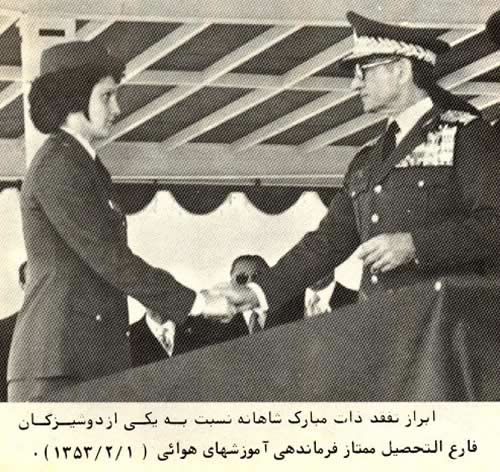
The women of Iran (Persia) played a major role in society before the Arabs invaded Iran and imposed their ideology of Islam on Iranian society.
Pre-Islamic Iran had Empresses such as Pourandokht and Azarmidokht who were in charge of the Empire and were given the title of Shahanshah (King of Kings). The historical Iranian Navy of that time had a well-known female Commander by the name of Artemis; various other high positions of power in the Armed Forces were also held by women.
From the time of the Arab invasion of Persia (around 600 AD) up to the early 1930's (almost 1400 years) Iranian women were not allowed to play a role in society due to the foreign, backward and anti-Iranian ideology of Islam, which through its adversaries were in control of Iran.
Come the Pahlavi era (1930 -1979) Iranian women once again became involved in state-affairs - as the Pahlavi King's reduced the power and influence of the Muslim clergy, who up until the arrival of Reza Shah the Great had an immense control over Iranian society. Reza Shah the Great made sure to reduce the political grip which the Mullah's (Islamic clergy) had held confing them to a mere religious role in which they were restricted in as well since the King did not look positively upon this backward ilk and their detrimental ideology. As early as 1933 Mrs. Marzieh Arfaee (Doctor) joined the Imperial Armed Forces with the rank of Capt. and became the first Iranian woman after 1400 years of Islamic occupation to gain the rank of General in the Imperial Iranian military.
In 1935 Mrs. Ozra Asgar Gilani became the first woman in the Imperial Iranian Air Force.
In 1939 a group of 9 women were enrolled in a pilot training program in Iran and Mrs. Effat Tejaratchi became the first Iranian woman to be given a pilot license (trained with the Tiger Mouth aircraft).
The first helicopter license was issued to Princess Fatemeh (Gen. Khatami's wife).
In 1966 the first series of women graduated from the Imperial Iranian Airforce (IIAF) in several fields including Electronic, Radar, Medical, Air Craft Maintenance, Flight crew, Air Traffic Controllers and Communication.
The first Iranian woman to become a senior officer in the IIAF was Maj. Parvaneh Noorvar (Doctor).
With the advent of the foreign sponsored Islamic coup in Iran 1979 the status of Iranian women were once again reduced to that of half a man according to Islamic laws and were disbanded from the armed forces and many other sectors. Today the immense progress that had been achieved during the Pahlavi Dynasty has been severely set back but the mullah's have found it troublesome to revoke some of the rights which women gained during the Pahlavi Era.
With the ending of the 2nd Arabo-Muslim Occupation of Iran (1979-Present) and the establishment of an Iranian Government, one that safeguards Iranian culture, Iranian women will regain the honorable position which they hold in our society. God bless all Iranian women who have struggled and fought for their rights under the current anti-Iranian Islamic Republic.
Also see: The IIAF page on Iranian women
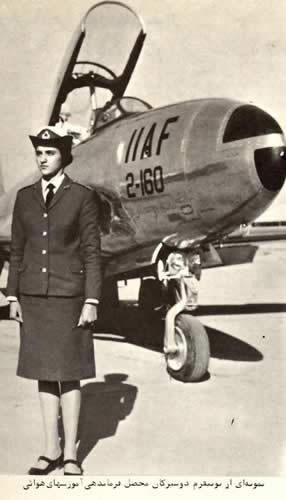
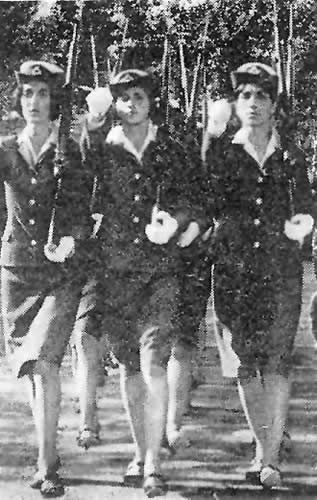
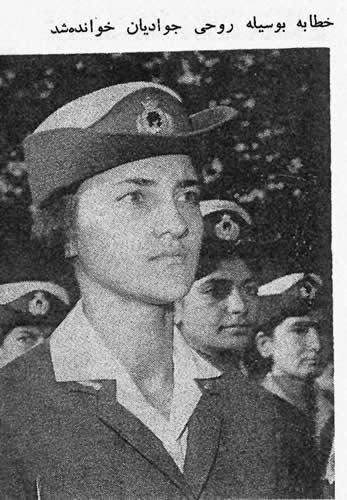
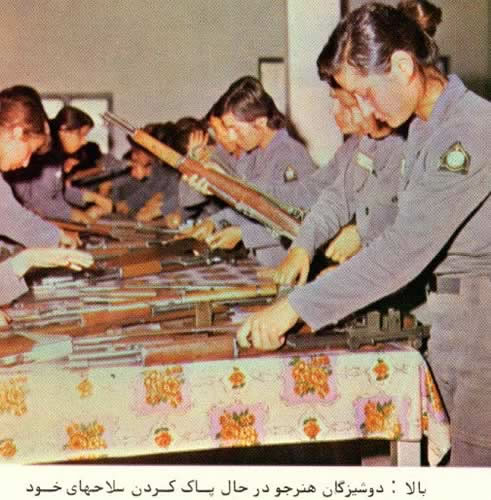
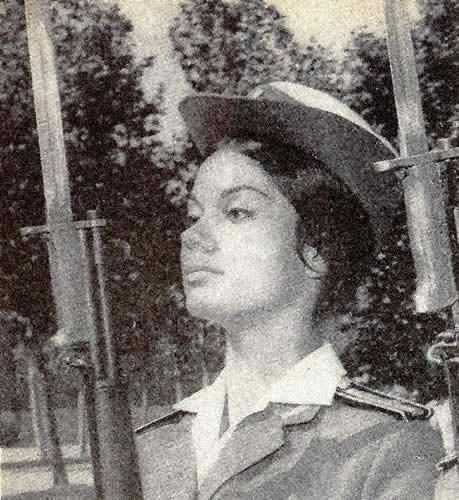
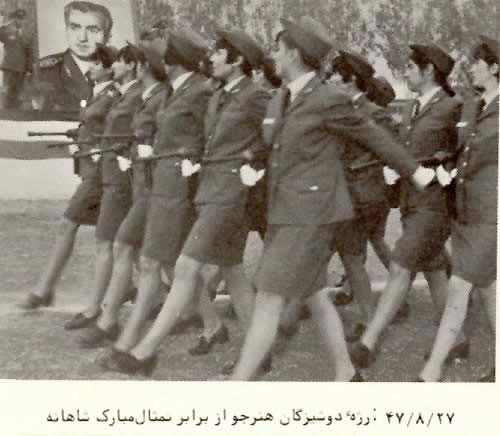
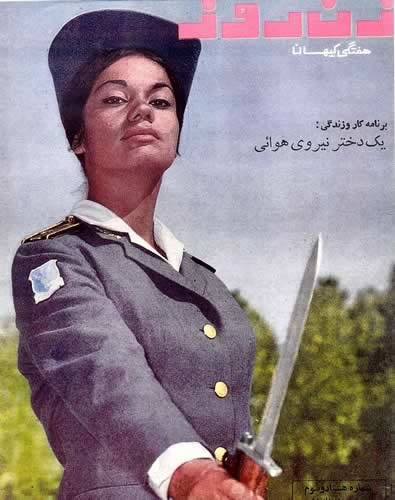
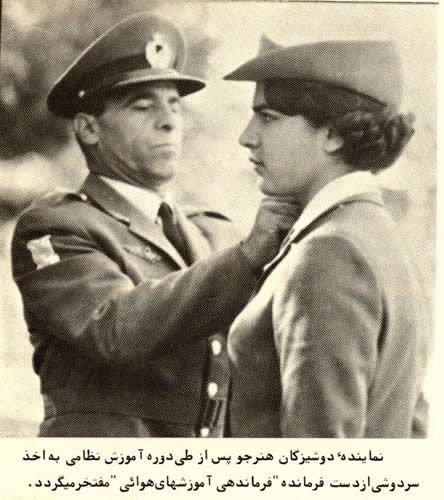
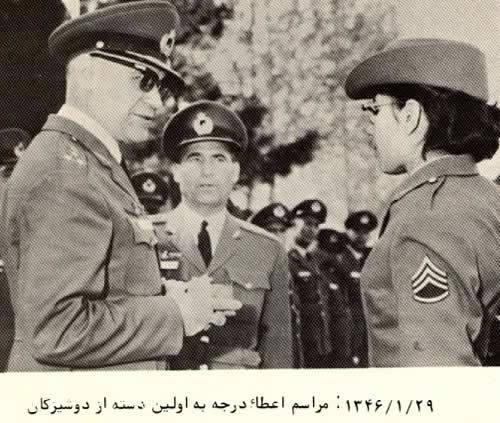
Friday, November 02, 2007
Islamic offensive against Iranian culture continues
 Picture depicts the ransacking and looting of an ancient Iranian Imperial Capital - by the invading Arabo-Muslim forces.
Picture depicts the ransacking and looting of an ancient Iranian Imperial Capital - by the invading Arabo-Muslim forces.Overnight Islamic Republic has wiped out 3000-Years of Iranian History
He stated: "despite all the previous meetings, communications and warnings, the authorities of the Ministry of Road and Transportation have chosen to ignore and in an unexpected move they have flattened and destroyed the historical site overnight."See full article HERE.
He added "Lordegan was one of the most ancient cities in the region and in many historical accounts have talked about its prosperous past, but to this date we have not succeeded in identifying its original location, nonetheless, Pol-Borideh could have provided us with many invaluable answers and could have assisted archaeologists in finding the ancient city, but now we have lost that chance."
Another local archaeologist who wished to remain anonymous for his safety said: "Israel should not be worried about the [Islamic] regime's threat of wiping it out from the map, it is us [Iranians] who should be worried, as the regime is determined to wipe us out of the map."
He added "everyday this anti-Iranian regime is coming up with a new plot to destroy our heritage. One day our heritage is being threatened by dam projects, the next its road constructions. They claim these are development projects, if this is the case why is our heritage being destroyed in the darkness of night and in secret - and why don't they sit down with the cultural authorities to find a solution to carry out their so-called development projects, and at the same time safeguard our national heritage?"
************************
 In other news the Georgian parliament will be discussing the possible restoration of the Georgian Monarchy which has been argued will bring peace and stability to that country. The motion which was first introduced by the Patriarch of the Georgian Orthodox Church has been received warmly by all opposition parties and by Georgians who remember the glory days of their ancient monarchy.
In other news the Georgian parliament will be discussing the possible restoration of the Georgian Monarchy which has been argued will bring peace and stability to that country. The motion which was first introduced by the Patriarch of the Georgian Orthodox Church has been received warmly by all opposition parties and by Georgians who remember the glory days of their ancient monarchy.As a supporter of the monarchic system I believe the Georgian Monarchy can potentially bring peace and stability to a country that is torn by ethnic tension/separatist groups and wide-spread political corruption. On top of that the rich and ancient Georgian culture will once again find a patron in the Royal Institution which will represent and unite all Georgians irregardless of their backgrounds. The Monarchy can unite the Georgian Nation under one banner and steer the country towards a more prosperous and stable future.
For more news regarding this event please see:
Link 1, Link 2, Link 3, Link 4, Link 5, Link 6
Campus clashes erupt in Iran - Students vs Islamist Forces

November 1, 2007 12:00 AM
Source: PajamasMedia
PJM Tehran: Reports of a series of clashes between university students and paramilitary forces outside Tehran are emerging writes PJM’s Ardeshir Arian, who is in regular communication with PJM’s Tehran correspondent.
By Ardeshir Arian in collaboration with PJM Tehran correspondent
Concentrated clashes took place yesterday between Allameh University students and the Basij paramilitary forces at the communications campus of Allameh Taba-tabaee University west of the city of Tehran.
According to sources inside the university, the unrest has not settled yet and the regime’s IRGC armored division has surrounded the campus by placing armored vehicles all around the troubled building.
Students chanting “Death to the Dictator” could be heard from a distance away. In some instance, local residents have came out in support of the students and against the regime forces.
(A video of students’ protest against Ahmadinejad in Tehran, after his Columbia University visit earlier this month is here)
On Tuesday, October 30th, 2007 the security forces arrested about twenty students from the same college, for protesting against the Islamic government actions against students.
All but three of the students arrested were released after signing prearranged repentance expressing remorse and agreeing to forfeit their civil rights if they reoffend.
Three of these students have refused to sign such documents which could turn into their legal death sentences if framed or arrested by the government agents again.
For that reason and other unspoken interests, the Ministry of Intelligence ordered the three students to be transferred to one of their undisclosed locations - presumably for interrogation and torture designed to break their spirits.
****
Also earlier this week Iranian students where staging anti-regime protests; for videoclips CLICK HERE.
Labels:
anti-regime,
Iran,
Iranian,
Islamic Republic,
islamists,
students,
university
Subscribe to:
Comments (Atom)

